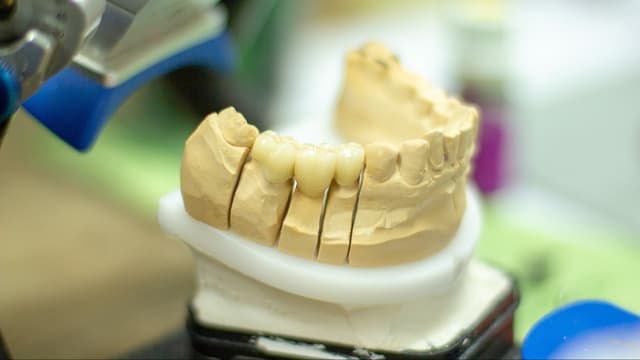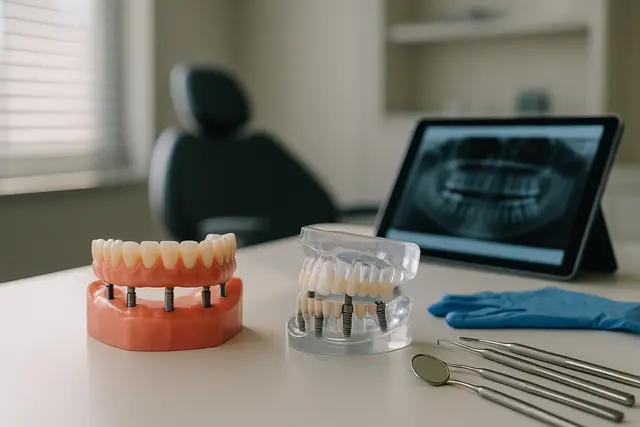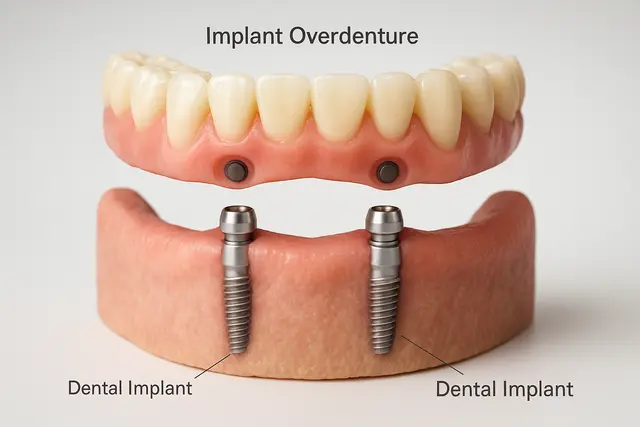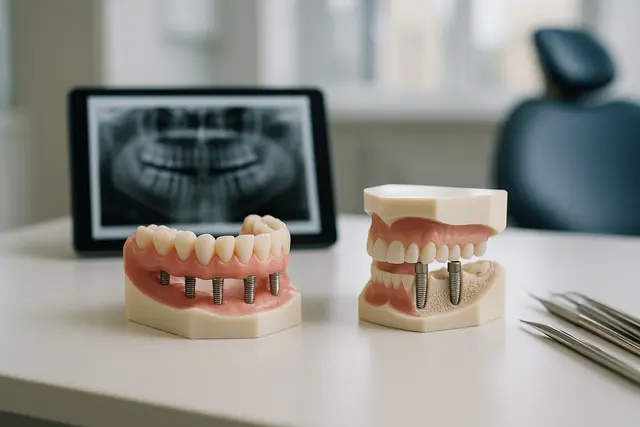Prosthodontics
5 min read
Mar 28, 2025
Dental Implants vs. Dentures: Which Offers Better Quality of Life?
Tooth loss isn't just a cosmetic issue, it alters how you live, eat, and feel. Implants are surgically placed into the jaw, aiming for permanence and stability. Dentures are removable and more accessible upfront but may compromise on functionality. Learn how each choice affects quality of life, from comfort and confidence to long-term costs and care.

Losing one or more teeth doesn’t just change how your smile looks, it can shake up your entire life. Suddenly, your go-to meals feel like a challenge, you’re more self-conscious during conversations, and you might even catch yourself avoiding photos altogether. It’s not just cosmetic; it’s confidence, comfort, and overall quality of life.
That’s why choosing the right tooth replacement option really matters. And if you’ve been debating between dentures or dental implants, you're not alone. These two solutions dominate the conversation around replacing missing teeth, but which one actually makes your life better day to day?
Let’s break it down in plain English.
Denture Life: The Classic Option (With a Few Bumps)
Dentures have been around longer than your grandma’s meatloaf recipe. For generations, they’ve helped folks smile again after tooth loss. Dentures are removable, meaning you take them out at night and clean them separately. They can be full dentures (replacing all the teeth on the upper or lower jaw) or partial dentures (if you’ve still got some natural teeth hanging in there).
Dentures are made to fit snugly on your gums and are held in place by suction, adhesives, or clasps, depending on the type of denture you choose. Because they’re not anchored into your jawbone like natural teeth, they can move around, especially when you’re eating or talking. And yes, that’s as awkward as it sounds.
Here’s the good news: dentures are more affordable than implants upfront. If you're considering dentures as a cost-friendly fix for missing teeth, it's a solid place to start. But here’s where things get tricky, your jawbone begins to shrink over time because dentures don’t stimulate it like real teeth do. That can make your denture looser over the years, requiring frequent adjustments. Not ideal.
Dentures typically need to be replaced every 5 to 7 years. And dentures don’t always feel like natural teeth. They can take time to get used to, and they might cause sore spots early on. But with patience and proper care, many people learn to live pretty comfortably with them.
Implants: The Long-Term MVP
Now let’s talk implants. Dental implants are like the high-tech cousin in this family of tooth replacement options. Instead of sitting on your gums, implants are surgically placed into your jawbone. They act as artificial tooth roots, creating a solid foundation for a dental crown or bridge that looks and functions just like the real thing.
Think of them as the closest you’ll get to having your natural teeth back.
Using dental implants has some clear benefits: they don’t slip or shift, they help keep your jawbone healthy, and they feel sturdy. Implants require surgery, yes, and there’s a healing period. But the result? Worth it, especially if you're in this for the long haul.
And here’s something else: dental implants can last decades, even a lifetime. That’s a pretty compelling argument for folks tired of refits and replacements. The dental implant procedure is more involved than getting dentures, but for many, the payoff is greater comfort, stability, and confidence.
The downside? The cost of dental implants is higher. Also, not everyone is a good candidate, people with weak jawbones or untreated gum disease may need additional work before getting started.
Can You Mix the Two? Yep, Enter Implant-Supported Dentures
If you’re stuck between the two, you might be glad to know there's a hybrid option: implant-supported dentures. Instead of sitting loosely on your gums, these dentures are attached to dental implants that are anchored into your jawbone. They’re more stable than traditional dentures and offer a strong, comfortable fit.
This type of denture gives you the coverage of full dentures with the support of implants. You won’t need as many implants as you would for replacing each tooth individually, usually four to six will do the trick for an entire arch. That makes implant-supported dentures a more budget-friendly middle ground.
They’re great for people who want a permanent denture feel without worrying about daily adhesives, slippage, or frequent adjustments. They also help stimulate your jawbone, which traditional dentures just don’t do.
Dentures vs Implants: The Quality of Life Showdown
Let’s get real for a minute. If you’re asking which option gives you a better quality of life, it depends on what your life looks like.
Dentures are typically more accessible. If you’re looking to replace all the teeth quickly and affordably, they can absolutely get the job done. But they may come with compromises, like less bite strength, more maintenance, and the chance of those cringe-worthy moments when they move around mid-meal.
Dental implants, on the other hand, are rock-solid. They let you eat what you want, laugh without worry, and smile like nothing’s missing. They look and feel like natural teeth. But they’re not cheap, and you need good dental health and jawbone density to qualify.
Here’s another thing to think about: implants stimulate the jawbone and prevent further bone loss, while dentures don’t. Missing teeth can affect not just your appearance but also your facial structure over time. Implants help avoid that “sunken” look that sometimes comes with long-term denture use.
So, if you’re active, love your food, and want the closest thing to your original smile, implants (or implant-supported dentures) are worth considering.
Other Things to Factor In
Let’s not forget the smaller stuff that matters a lot over time.
Dentures are removable, which can be a blessing or a curse depending on how you feel about cleaning and adhesives.
Dentures replace a lot at once, but they also wear down faster.
Implants require healing and patience, but they often feel better, function better, and last longer.
The number of implants required and the type of dental prosthetic (crown, bridge, or denture) affects both the process and price.
There’s also a full range of choices under both umbrellas, from immediate dentures to partial dentures and beyond.
Whether you’re replacing one or more missing teeth, there are replacement options tailored for your situation.
So... Dentures or Dental Implants?
Here’s the honest answer: it’s personal. Some people swear by their implants and wouldn’t go back for anything. Others find that dentures offer everything they need, especially if budget or health limits their options.
If you’re already wearing dentures and finding them uncomfortable, implant-supported dentures might be a good next step. If you’re missing just one or two teeth and want something that blends in and lasts, a single dental implant might be your best bet.
Bottom line? The right choice for your dental health depends on your lifestyle, budget, and goals. A good dental professional can help you explore the pros and cons of each option, check the health of your gums and jawbone, and help you find a path that works for you.
Whichever way you go, just remember: replacing missing teeth isn’t only about chewing or smiling, it’s about enjoying life without worry. Whether it’s chatting with friends, biting into a burger, or laughing so hard your cheeks hurt, the right dental solution should help you feel more like you again.
What Are the Main Differences Between Dentures and Dental Implants?
Dentures are removable appliances that rest on the gums, while dental implants are surgically placed into the jawbone and act like permanent tooth roots. Dentures are more affordable upfront but can slip, require adhesives, and may need frequent adjustments. Implants are more stable, preserve jawbone health, and feel more like natural teeth, though they come with a higher initial cost and longer healing time.
How Do Implant-Supported Dentures Work?
Implant-supported dentures combine the full-arch coverage of traditional dentures with the stability of implants. Instead of resting solely on the gums, these dentures snap onto 4 to 6 implants anchored in the jaw. This offers better bite strength, improved comfort, and less movement during daily activities. They also help stimulate the jawbone to reduce long-term bone loss.
Which Option Offers Better Long-Term Value?
While dentures cost less upfront, they may need to be replaced every 5 to 7 years and often require periodic relines. Implants, on the other hand, can last decades with proper care and offer more natural function. Over time, the durability and bone-preserving benefits of implants may result in fewer follow-up costs and a better return on your investment.
How Do I Know If I’m a Good Candidate for Dental Implants?
Good candidates for implants typically have healthy gums, enough jawbone density, and no uncontrolled health issues like diabetes or gum disease. If you've worn dentures for years, your dentist may recommend imaging to assess bone structure. Even if you don’t qualify immediately, treatments like bone grafts or choosing implant-supported dentures may still be viable options.
Read Next
Related Posts

Prosthodontics
Implant Supported Dentures Overview
Missing teeth can impact more than just your smile, they can affect your confidence, comfort, and even your diet. Fortunately, modern dentistry offers a solution that’s both secure and natural-looking: implant-supported dentures. This innovative approach blends the stability of implants with the convenience of dentures to create a long-lasting, life-improving upgrade.
5 min read
Oct 29, 2025

Prosthodontics
Implant Overdentures Explained: The Hybrid Solution to Missing Teeth
Missing teeth can impact everything from your ability to eat to your self-confidence. While traditional dentures have long been a go-to solution, they often fall short in comfort and stability. Implant overdentures offer a modern alternative that combines the security of dental implants with the convenience of removable dentures, a true upgrade for those looking to reclaim their smile.
6 min read
Oct 29, 2025

Prosthodontics
Implant Retained Dentures Explained
Considering implant-retained dentures? You're not alone. As modern dentistry evolves, more people are turning to this secure, natural-feeling alternative to traditional dentures. This guide will walk you through what they are, how they work, and why they might be the solution you've been looking for.
4 min read
Oct 28, 2025
Don’t have time to research every dentist around you?
See why 30k+ patients trusted us